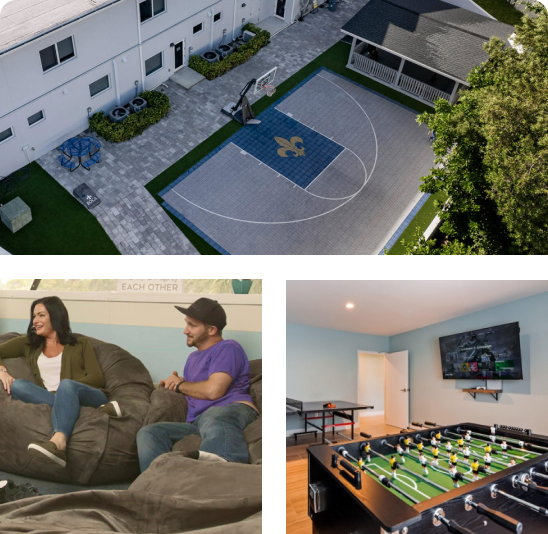 500+ 5-Star Reviews
500+ 5-Star Reviews 500+ 5-Star Reviews
500+ 5-Star Reviews
Cognitive Behavioral Therapy
Cognitive behavioral therapy (CBT) is an evidence-based treatment that can help you address an addiction at its root.[1] What are the thoughts and behaviors that cause substance use? CBT at Boca Recovery Center can help you find out.





Cognitive Behavioral Therapy at Boca Recovery Center
CBT is a highly structured form of psychotherapy that helps people struggling with substance use disorders (SUDs).[1] During your sessions at Boca Recovery Center, your therapist breaks down the thoughts, feelings, and actions contributing to your addiction.
CBT sessions at Boca Recovery Center are conducted by highly experienced therapists who work like coaches, not professors. You’ll dig into the source of your SUD with someone who believes in you and your future.
Clients are encouraged to discuss irrational thoughts, negative emotions, and life stressors frankly. Our therapists can uncover useful, actionable strategies that bring about measurable results.

What to Expect
Evaluation
CBT is a proven treatment option for people with SUDs, but it’s not the right approach for everyone. Before adding this to your treatment protocol, your treatment team will learn more about your past, including your prior treatment attempts. Boca Recovery Center always customizes care to help people recover.
Learning
Therapists at Boca Recovery Center have received extensive training in CBT techniques to help clients discover the power of positive thoughts. CBT works by increasing a person’s awareness of their thoughts, emotions, and actions, as well as the consequences of their actions. This helps recovering individuals to better understand how the three are interconnected and how they lead to substance abuse.
Treatment
CBT is a flexible, customizable treatment for SUDs. Your program at Boca Recovery Center will take many forms. You’ll participate in individual therapy, group therapy, phone coaching, and consultation. As your needs change, so will your program. You’ll get just what you need when you need it.
Benefits of Cognitive Behavioral Therapy (CBT)
CBT is a proven therapy for people with SUDs. CBT comes with the following benefits:[1,2]
- Goal-oriented therapy - CBT is a practical form of therapy that allows you to both see and measure your results.
- Collaboration - Your counselor at Boca Recovery Center is your partner in recovery, and you’ll work together to improve your life.
- Individualized treatment - CBT is designed around you, your thoughts, and your needs — not anyone else's needs.
- Co-occurring disorders - CBT has been proven effective in helping people with other mental health issues, such as anxiety, depression, and ADHD.
What Patients Say

"This is an awesome place where they really care about you! They really go out their way to help you, they are compassionate about what they do and today I can say thank you Boca for being there and being a big part of my recovery journey."
A.R

"Being the first client to go through Boca Recovery Center, I can honestly say it was the best decision of my life. I have never been in a facility where every person working there treats you as if you are their family and is there for you every step of the way. It was the most loving and caring facility I have ever attended."
Michael M.

Boca recovery housing was very comfortable for the time I spent there. The apartment has two bedrooms fully furnished with kitchen appliances and all the necessary items to cook meals every day. It definitely allowed me to transition back to reality very easily as I was attending groups and AA meetings every day. I enjoyed using the gym and basketball they provided. I would recommend to anyone.
Erik
Why Choose Us?
Proven Success in Addiction Care
We’ve helped over 6,000 patients fight and overcome their addiction and we truly understand the level of care needed to achieve long-term sobriety.
World-Class Treatment & Staff
We have some of the best medical directors that focus on creating customizable treatment plans to help patients overcome addiction
Top 10% of Rehabs in the U.S.
Our industry accreditations put us as the top 10% of rehabs in the U.S.
Flexible Payment Options
Frequently Asked Questions
CBT is a research-based, result-oriented treatment with a practical approach to problem-solving. It addresses the root cause of addiction (unhealthy thinking patterns and behaviors).
CBT exercises involve revisiting painful emotions and learning positive behaviors to replace them. The idea is to teach skills, so the recovering individual does not need to rely on alcohol or drugs as a coping mechanism. The goal is to help recovering individuals gain control over unwanted thoughts and emotions. This can reduce relapse risk.
Underlying mental health issues, including anxiety and depression, can complicate SUD recovery. For many people, CBT offers insights about the interplay between mental health and substance use. It makes healing possible.
Yes. CBT is part of the toolkit offered to clients at Boca Recovery Center. Our therapists help clients develop skills to identify and interrupt negative thoughts. Recovering individuals learn to anticipate triggers and develop the self-control to cope with them.
